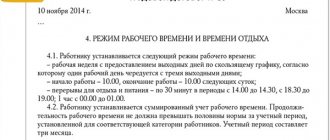104New edition of Art. 104 Labor Code of the Russian Federation
When, due to the production (work) conditions of an individual entrepreneur, in an organization as a whole, or when performing certain types of work, the daily or weekly wages established for this category of workers (including workers engaged in work with harmful and (or) dangerous working conditions) cannot be met. duration of working hours, it is allowed to introduce summarized recording of working hours so that the duration of working hours for the accounting period (month, quarter and other periods) does not exceed the normal number of working hours. The accounting period cannot exceed one year, and for recording the working time of workers engaged in work with harmful and (or) dangerous working conditions - three months.
If, for reasons of a seasonal and (or) technological nature, for certain categories of workers engaged in work with harmful and (or) dangerous working conditions, the established working hours cannot be observed during an accounting period of three months, the industry (inter-industry) ) the agreement and collective agreement may provide for an increase in the accounting period for recording the working time of such employees, but not more than up to one year.
The normal number of working hours for the accounting period is determined based on the weekly working hours established for this category of workers. For employees working part-time (shift) and (or) part-time week, the normal number of working hours for the accounting period is reduced accordingly.
The procedure for introducing summarized recording of working time is established by the internal labor regulations.
Commentary on Article 104 of the Labor Code of the Russian Federation
Time tracking is the measurement of compliance with an employee's obligation to fulfill standard working hours. There are modes with daily, weekly and summarized recording of working time.
In accordance with Article 100 of the Labor Code of the Russian Federation, when organizing the labor process, organizations have the right to resort to daily 5-day work with two days off, daily 6-day work with one day off, a working week with days off on a sliding schedule, and in accordance with with Article 104 of the Labor Code of the Russian Federation - to the summarized recording of working time.
The daily work schedule in practice is called the daily working time recording regime.
With daily accounting, the working hours set for workers exactly correspond to the norm during the working day. This is enshrined in the internal labor regulations. In daily accounting, work beyond the norm is overtime.
Summarized accounting is a type of working time accounting that provides for a longer period than a day or a week. It performs not only the function of measuring the performance of working time. In addition, it is a unique form of labor organization, a form of working time regime. The minimum duration is a month, and the maximum is a year.
The essence of summarized accounting is that the duration of working hours during the day during the accounting period, on average, would be equal to the norm of the working day.
In organizations or when performing certain types of work, where, due to production (work) conditions, the daily or weekly working hours established for a given category of workers cannot be observed, it is allowed to introduce summarized recording of working time so that the working time for the accounting period (month) , quarter, etc.) did not exceed the normal number of working hours.
Summarized recording of working time can be weekly, monthly, quarterly and even annual. This method of accounting is used, for example, when organizing work on a rotational basis, in transport, etc. This means that the duration of working time during the accounting period should not exceed the normal number of working hours, and if a question arises about a deviation from the normal duration of working time, it the standard will be calculated from the corresponding period. The same applies to shortcomings within such a period. It is allowed to lengthen individual shifts provided that other shifts are reduced within the accounting period. The recording of working time must be clearly recorded in the established period. Overtime within a predetermined period must be recognized as overtime work.
Usually, summarized monthly accounting of working time is used, according to which the norm of working time established by current legislation must be worked in a month. In this case, the monthly standard of working time is determined based on the normal or reduced duration of the working week (working day) and the number of working days in a month according to the calculated schedule of a 5-day working week with two days off according to the rules for calculating the duration of the working day.
There are two types of summarized accounting:
1. An employee works an unequal number of hours on different days of the accounting period, i.e. The duration of daily work within the accounting period varies. In this case, all time worked during the accounting period is calculated, and overtime on certain days of the accounting period must be compensated by underwork or complete rest on other days. In this form, overtime is considered only hours worked in excess of the norm for the entire accounting period as a whole, but not for each individual day.
2. The duration of daily work is firmly fixed. Shift schedules drawn up on the basis of this form provide for an increase in the duration of daily work with a simultaneous increase in the number of days off in the accounting period. The standard working time is ensured as an average value, derived not from the unequal length of working days (as for the first type), but by reducing the number of working days in a month. With this type of overtime, work in excess of the fixed schedule of the duration of the work shift is considered, but if the schedule is drawn up in such a way that it is forced to include overtime in excess of the accounting period (otherwise it is impossible, the shift cannot be shortened), then such overtime is not considered overtime work, but is compensated by time off, and Overtime overtime is like overtime.
The amount of compensation is calculated as follows: the first two hours, obtained from multiplying the number of working days on the calendar of a 6-day working week by two, are one and a half hours, the rest are double.
The maximum duration of a work shift with cumulative recording of working hours is not limited. In practice, it is usually 10 - 12 hours. Most often, such working time recording is used in continuously operating organizations.
Article 104. Summarized recording of working time
Determination of the Supreme Court of the Russian Federation dated April 15, 2008 N 46-B08-2 When, due to the production (work) conditions of an individual entrepreneur, in the organization as a whole, or when performing certain types of work, the daily or weekly working hours established for a given category of workers cannot be observed , it is allowed to introduce summarized recording of working hours so that the duration of working hours for the accounting period (month, quarter and other periods) does not exceed the normal number of working hours (Article 104 of the Labor Code of the Russian Federation).
Determination of the Supreme Court of the Russian Federation dated July 6, 2010 N KAS10-309
According to the applicant, the fact that the procedure for recording actually worked time is established by the employer contradicts Art. 104 of the Labor Code of the Russian Federation. The statement also indicated that the disputed Order was adopted in violation of the procedure for its adoption without the consent of the Ministry of Health and Social Development of the Russian Federation.
Decision of the Supreme Court of the Russian Federation dated May 21, 2010 N GKPI10-182
The applicant motivates his demands by the fact that: paragraph 20 of the Regulations provides for the number of cumulative days of rest provided for work performed in excess of normal working hours, only according to the schedule of shifts for the main position, without taking into account other periods of work of members of the crew: the time the employee performs work for a missing employee, the time required to perform emergency and emergency work, which is contrary to the article of the Labor Code of the Russian Federation; paragraph 21 of the Regulations allows for the transfer of the use of accumulated rest days beyond the accounting period, but not for more than one year, which contradicts the article of the Labor Code of the Russian Federation, which sets the maximum duration of overtime work at 120 hours per year; paragraph 24 of the Regulations establishes that in the case of attracting seafarers to work during the period of providing cumulative rest days, rest days are not transferred to another period, which contradicts Article 152 of the Labor Code of the Russian Federation, generally recognized principles and norms of international law of the ILO; Clause 32 of the Regulations stipulates that the procedure for recording actual working time is established by the employer, which contradicts Article 104 of the Labor Code of the Russian Federation, according to which the procedure is established by internal labor regulations.
Decision of the Supreme Court of the Russian Federation dated June 26, 2018 N AKPI18-376
Y. appealed to the Supreme Court of the Russian Federation with an administrative claim for recognition as invalid from the date of adoption (March 9, 2021) of the second paragraph of paragraph 38 of the Features, as contrary to Articles 100, 104 and 111 of the Labor Code of the Russian Federation (hereinafter referred to as the Labor Code of the Russian Federation, Code ), and paragraph three of paragraph 48 of the Peculiarities in the part establishing the period no later than which (May 1 of the next calendar year) unused rest time between shifts must be compensated by providing additional rest time at the end of the period of mass passenger transportation, as contrary to Articles , , 104 and 152 Labor Code of the Russian Federation. According to the administrative plaintiff, when accounting for working hours together with an accounting period of one year, unused rest time between shifts should be compensated for employees of train crews of passenger trains and ticket cashiers on railway transport by providing additional rest time at the end of the period of mass passenger transportation, but no later than the end of the calendar year , and unused rest time between shifts at the end of the accounting period is overtime work and is subject to payment in accordance with Article 152 of the Labor Code of the Russian Federation. The contested norms violate her rights, guaranteed by law for a five-day working week and wages when hired to work on a day off at double the rate, and when recruited to work on rest between shifts - at one and a half times the rate.
Appeal ruling of the Appeal Board of the Supreme Court of the Russian Federation dated October 18, 2018 N APL18-421
Ya., working as a conductor of passenger cars, filed an administrative claim with the Supreme Court of the Russian Federation for recognition as invalid from the date of adoption of the second paragraph of paragraph 38 of the Peculiarities due to its contradiction with Articles 100, 104 and 111 of the Labor Code of the Russian Federation (hereinafter referred to as the Labor Code of the Russian Federation) , Code), and paragraph three of paragraph 48 of the Peculiarities in the part establishing the period (May 1 of the next calendar year), no later than which the employee must be compensated for unused rest time between shifts by providing additional rest time at the end of the period of mass passenger transportation, as contrary to articles , , 104 and 152 of the Labor Code of the Russian Federation. In the statement, she indicated that for conductors of passenger cars in the Arkhangelsk carriage section of the Northern Branch of the Federal Passenger Company JSC, a summarized recording of working time has been established with an accounting period of one year; in the shift schedules, the employer indicates one day off as a weekly rest day, as with a six-day working day. week. During the period of mass passenger transportation (June - September), a special rest time regime is established annually for this category of workers, in which inter-shift rest at the place of permanent work is provided in a reduced form - in the amount of at least half of the rest time they are entitled to. Unused inter-shift rest time at the end of the calendar year (accounting period) is not paid as overtime work, but is compensated in accordance with paragraph 48 of the Specifics in the form of additional rest time until May 1 of the next calendar year. The contested provisions of the Peculiarities violate the rights of the administrative plaintiff guaranteed by law to a five-day work week and wages when hired to work on a day off at double the rate, and when recruited to work on inter-shift rest - at one and a half times the rate.
Decision of the Supreme Court of the Russian Federation dated August 26, 2019 N AKPI19-469
By virtue of parts one and four of Article 104 of the Labor Code of the Russian Federation, when, due to the conditions of production (work) for an individual entrepreneur, in the organization as a whole, or when performing certain types of work, the established for this category of workers (including workers engaged in with harmful and (or) dangerous working conditions) daily or weekly working hours, it is allowed to introduce summarized recording of working hours so that the duration of working hours for the accounting period (month, quarter and other periods) does not exceed the normal number of working hours. The accounting period cannot exceed one year, and for recording the working time of workers engaged in work with harmful and (or) dangerous working conditions - three months. The procedure for introducing summarized recording of working time is established by the internal labor regulations.
Appeal ruling of the Appeal Board of the Supreme Court of the Russian Federation dated December 3, 2019 N APL19-431
By virtue of Article 104 of the Labor Code of the Russian Federation, when, due to the conditions of production (work) for an individual entrepreneur, in the organization as a whole, or when performing certain types of work, the established for this category of workers (including workers engaged in work with hazardous and ( or) hazardous working conditions) daily or weekly working hours, it is allowed to introduce summarized recording of working hours so that the duration of working hours for the accounting period (month, quarter and other periods) does not exceed the normal number of working hours. The accounting period cannot exceed one year, and for recording the working time of workers engaged in work with harmful and (or) dangerous working conditions - three months (part one). The procedure for introducing summarized recording of working time is established by the internal labor regulations (part four).
Decision of the Supreme Court of the Russian Federation dated 09/08/2020 N AKPI20-396
By virtue of parts one and three of Article 104 of the Labor Code of the Russian Federation, when, due to the conditions of production (work) for an individual entrepreneur, in the organization as a whole, or when performing certain types of work, the established for this category of workers (including workers engaged in work with harmful and (or) dangerous working conditions) daily or weekly working hours, it is allowed to introduce summarized recording of working hours so that the duration of working hours for the accounting period (month, quarter and other periods) does not exceed the normal number of working hours. The accounting period cannot exceed one year, and for recording the working time of workers engaged in work with harmful and (or) dangerous working conditions - three months. The normal number of working hours for the accounting period is determined based on the weekly working hours established for this category of workers.
Appeal ruling of the Appeal Board of the Supreme Court of the Russian Federation dated December 3, 2020 N APL20-394
By virtue of parts one and three of Article 104 of the Labor Code of the Russian Federation, when, due to the conditions of production (work) for an individual entrepreneur, in the organization as a whole, or when performing certain types of work, the established for this category of workers (including workers engaged in work with harmful and (or) dangerous working conditions) daily or weekly working hours, it is allowed to introduce summarized recording of working hours so that the duration of working hours for the accounting period (month, quarter and other periods) does not exceed the normal number of working hours. The accounting period cannot exceed one year, and for recording the working time of workers engaged in work with harmful and (or) dangerous working conditions - three months. The normal number of working hours for the accounting period is determined based on the weekly working hours established for this category of workers.
Decision of the Supreme Court of the Russian Federation dated August 30, 2006 N GKPI06-632
However, in accordance with Article 104 of the Labor Code of the Russian Federation, in organizations or when performing certain types of work, where, due to production (work) conditions, the daily or weekly working hours established for a given category of workers cannot be observed, it is allowed to introduce summarized recording of working hours in order to so that the duration of working hours for the accounting period (month, quarter, etc.) does not exceed the normal number of working hours.
Decision of the Supreme Court of the Russian Federation dated April 15, 2004 N GKPI2004-481
From the content of Article 104 of the Labor Code of the Russian Federation it follows that in organizations or when performing certain types of work, where, due to production (work) conditions, the daily or weekly working hours established for a given category of workers cannot be observed, it is allowed to introduce summarized recording of working hours in order to so that the duration of working hours for the accounting period (month, quarter, etc.) does not exceed the normal number of working hours.
Another comment on Art. 104 Labor Code of the Russian Federation
1. Summarized accounting of working time allows for deviation of the duration of working time per day and during the week from the norm established for a given category of workers with subsequent compensation for overtime by underwork on other days (weeks) or the provision of additional days of rest, so that within a certain accounting period the total the working hours did not exceed the normal number of working hours for this period. Thus, with summarized accounting, the standard working time (for example, 40 or 36 hours per week) is provided, but not for a week, but for another, longer accounting period. The length of the accounting period can be different: three weeks, a month, three months, etc. - depending on production conditions, but not more than one year.
2. The duration of working hours during the accounting period should not exceed the normal number of working hours. Part 2 Art. 104 of the Labor Code of the Russian Federation (as amended by Federal Law No. 90-FZ of June 30, 2006) explains the concept of the normal number of working hours for the accounting period. It is determined based on the weekly working hours established for this category of workers. In cases where summarized recording of working time is introduced for employees working part-time (Article 93 of the Labor Code of the Russian Federation), the normal number of working hours is correspondingly reduced, i.e. is determined based on the length of the working week established for these employees.
3. Part 3 art. 104 of the Labor Code of the Russian Federation does not require that the summarized recording of working time be introduced directly by the internal labor regulations. The internal labor regulations should only establish the procedure for introducing summarized accounting. The rules, for example, may determine that summary accounting is introduced by order (instruction) of the employer (head of the organization, individual entrepreneur), taking into account the opinion of the elected body of the primary trade union organization or without it.
4. A type of labor regime with summarized accounting of working time is the rotation method of organizing work, which is a special form of carrying out the labor process outside the place of permanent residence of workers, when their daily return to their place of permanent residence cannot be ensured (see Art. 300, 301 of the Labor Code of the Russian Federation and commentary thereto).
Question
A woman works in a 24-hour supermarket on a 2/2 schedule. In this case, departure for shift can be carried out either at 6:00 in the morning or at 18:00 in the evening. Throughout December 2021, the schedule changed several times, and workers only learned about the changes the day before. In particular, the woman was forced to go to work on New Year's Eve, although according to the schedule she was supposed to rest on that day. The situation is similar in January 2016. Is it possible to force an employer to comply with labor laws?
Lawyer's response:
An employee’s work in shift mode is regulated by an employment contract, work schedule, as well as the norms of the Labor Code of the Russian Federation.
According to Art. 103 of the Labor Code of the Russian Federation, the shift schedule must be approved and brought to the attention of employees no later than 1 month before its introduction. At the same time, engaging any employee to work for 2 shifts in a row is unacceptable. As evidenced by Art. 104 of the Labor Code of the Russian Federation, if when performing certain work operations the established duration of working time cannot be observed, it is necessary to introduce its summarized accounting. This eliminates the excess of working hours for a certain accounting period over the normal number of working hours. In this case, the total duration of the accounting period cannot be more than 1 year. Work activities within the boundaries of a properly organized shift schedule do not entail the formation of overtime hours.
If overtime occurs within the framework of a shift schedule, it can be concluded that the supermarket management is incorrectly applying the shift schedule. According to Art. 152 of the Labor Code of the Russian Federation, overtime hours must be paid at an increased rate (for the first two hours - at one and a half times, for subsequent hours - at double).
At the same time, in accordance with Art. 103 of the Labor Code of the Russian Federation, the duration of overtime work cannot exceed 4 hours for each employee for 2 consecutive days and 120 hours during the year. You can force an employer to comply with labor laws by filing a complaint with the labor inspectorate or the prosecutor's office.
Question
Can a company operate a “every other day” work schedule (as indicated in the employment contract), if each employee has 11-12 24-hour shifts per month? After the workers appealed to the company management, the answer was received that the Labor Code has a special article on overtime and that everything in the company is organized legally.
Lawyer's response:
Since February 1, 2002, labor relations have been regulated by a new code (Labor Code of the Russian Federation), which replaced the Labor Code. In accordance with Art. 103 of the Labor Code of the Russian Federation, shift work is subject to introduction in cases where it is necessary to ensure the effective use of equipment, or when the duration of the technological process is higher than the permissible duration of daily work. Moreover, each group of workers is obliged to carry out labor activities in accordance with the approved shift schedule. Such a schedule must be brought to the attention of employees no later than 1 month before implementation. Employment for two shifts in a row is not permitted. In accordance with Art. 104 of the Labor Code of the Russian Federation, if, when carrying out a specific work, the established duration of working time cannot be observed, it is possible to introduce its summarized accounting, which eliminates the excess of the duration of working time for the accounting period over the normal number of working hours. You should know that the duration of the accounting period should not exceed 1 year. Thus, working within a shift schedule should not lead to overtime. If overtime work occurs within the framework of a shift schedule, then the company management incorrectly uses the shift schedule, using overtime work. In accordance with Art. 152 of the Labor Code of the Russian Federation, overtime work is subject to payment at an increased rate (for the first 2 hours - at one and a half hours, for subsequent hours - at double). At the same time, according to Art. 99 of the Labor Code of the Russian Federation, the duration of overtime work should not exceed 4 hours for each employee for 2 consecutive days and 120 hours per year.
Article 91 of the Labor Code of the Russian Federation. The concept of working time. Normal working hours
To understand the correct process of calculating and recording working time by the employer, as well as maintaining timesheets, Article 91 of the Labor Code will help. An employee who carries out his professional functions and does not violate the rules of the organization receives a salary, and the manager pays it twice a month in one hundred percent amount for the time included in the time sheet.
Working time concept
Law No. 90-FZ of June 30, 2006 provides a clear definition of periods of professional activity. Working time in the legal field is understood as the period during which a person is obliged to perform personal functions specified in the contract. At the same time, the citizen must unquestioningly follow the working day rules in force within the company and the terms of the contract concluded with him. This segment also includes other time periods that are equal to working time and prescribed in other regulations.
It is important to know! The period of time during which a person performs his functions in accordance with the signed agreement is calculated at 40 hours per week.







